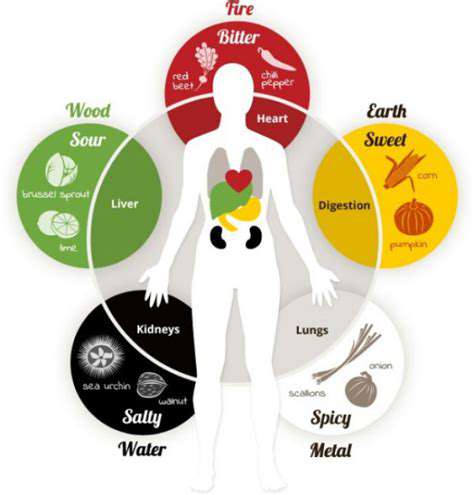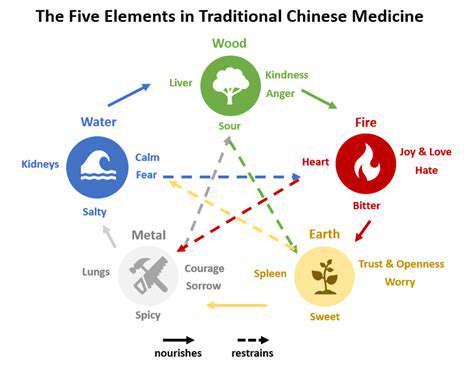Herbal Medicine in TCM: Nature's Healing Power
The Role of Diagnosis in Herbal Selection

The Importance of Accurate Diagnosis
A precise diagnosis is fundamental to successful herbal therapy. Herbal remedies, unlike pharmaceuticals, often target specific symptoms or imbalances within the body, rather than a single disease. Therefore, an accurate assessment of the patient's overall health, including their medical history, lifestyle, and current symptoms, is crucial. This comprehensive approach allows practitioners to tailor herbal prescriptions to the individual's specific needs, maximizing effectiveness and minimizing potential risks.
Without a thorough diagnosis, practitioners risk prescribing herbs that may not address the root cause of the patient's concerns or, worse, might exacerbate existing conditions. Accurate diagnosis ensures that the herbal remedies are used appropriately and safely, ultimately leading to better patient outcomes. This involves a careful consideration of all contributing factors, including diet, stress levels, and underlying health conditions, to gain a complete picture of the patient's health state.
Differential Diagnosis and Herbal Selection
Differential diagnosis is an essential component of herbal medicine. It involves distinguishing between various possible causes for a patient's symptoms. This process helps practitioners identify the most appropriate herbal remedies to address the specific underlying issues. For example, fatigue might be caused by various factors, including anemia, stress, or poor diet. A thorough investigation into these possibilities will help narrow down the potential causes and facilitate the selection of the most effective herbal remedy.
Once potential causes are identified, practitioners can select herbs that address the particular imbalances. For example, if anemia is suspected, herbs known for their iron-boosting properties might be considered, while for stress-related fatigue, adaptogenic herbs could be more suitable. This precise selection is crucial for optimizing the effectiveness of herbal treatments and ensuring patient safety.
The Role of Patient History and Physical Examination
A comprehensive patient history is paramount to an accurate herbal diagnosis. This includes not only the presenting complaint but also a detailed account of the patient's medical history, including any pre-existing conditions, allergies, and current medications. This information provides critical context for understanding the patient's overall health status and potential interactions with herbal remedies. Lifestyle factors such as diet, exercise, and stress levels also play a significant role.
A thorough physical examination, which may include pulse diagnosis, tongue observation, and other traditional assessments, is frequently employed. These methods provide valuable insights into the patient's energetic state and help to identify any imbalances that may be contributing to the presenting symptoms. Combined with the patient history, this information allows for a holistic approach to diagnosis, leading to more effective and personalized herbal treatment plans.
Safety and Considerations in TCM Herbal Therapy

Safety Precautions in Traditional Chinese Medicine
Traditional Chinese Medicine (TCM) offers a wealth of therapeutic options, but it's crucial to understand the potential safety considerations before embarking on any treatment. Properly trained and licensed practitioners are essential, ensuring they understand the interactions between herbs, acupuncture points, and any pre-existing health conditions. It's important to disclose all medical conditions and medications to your practitioner to avoid potential complications.
While generally considered safe when practiced correctly, TCM treatments can sometimes have adverse effects. These can range from mild discomfort, such as bruising from acupuncture, to more serious reactions. Open communication with your practitioner about any concerns or unusual symptoms is crucial to ensure the treatment is appropriate and well-managed.
Herbal Interactions and Potential Risks
Many TCM treatments utilize herbal remedies, and these herbs can interact with conventional medications. It's vital to disclose all medications, both prescription and over-the-counter, to your TCM practitioner, as interactions can lead to unforeseen health consequences. Herbal remedies are not always risk-free, and potential allergic reactions or adverse effects should be carefully considered.
Some herbs may have contraindications for specific health conditions. For example, certain herbs might not be suitable for individuals with pre-existing liver or kidney problems. Always consult with a qualified TCM practitioner and your primary care physician before incorporating herbal remedies into your treatment plan.
Acupuncture and Potential Side Effects
Acupuncture, a cornerstone of TCM, involves inserting thin needles into specific points on the body. While generally considered safe, potential side effects can include bruising, bleeding, and infection at the insertion site. Practitioners should be meticulous in their technique to minimize these risks.
Individuals with certain medical conditions, such as blood clotting disorders or skin infections, may need to exercise caution when considering acupuncture. It is essential to discuss any concerns with your practitioner to determine the suitability of this treatment for your specific situation.
Patient Education and Informed Consent
Understanding the nuances of TCM is critical for patient safety and optimal outcomes. Patients should be actively involved in their treatment plan by asking questions and seeking clarification on the chosen therapies. Open communication fosters a collaborative approach and ensures that patients are well-informed about the procedures and potential benefits and risks involved.
Obtaining informed consent is paramount. This involves a comprehensive discussion about the treatment plan, potential side effects, and alternative options. Patients should feel empowered to ask questions and express concerns, ensuring they fully understand the implications of the treatment.











